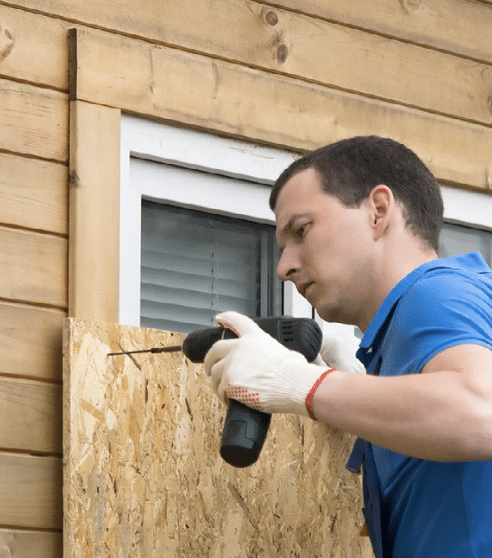By Marcus Fernandez
Most people in Florida, about 15 million out of a total population of approximately 20 million, reside in coastal areas of the state. This puts them at peril from the damaging effects of hurricanes and tropical storms.
Tropical storms and hurricanes begin as low-pressure weather systems the National Weather Service refers to as tropical cyclones. As its wind speeds increase, a tropical cyclone may develop into a tropical depression with winds up to 38 mph. The next level is a tropical storm with sustained winds up to 73 mph. The highest level is a hurricane, with sustained winds of 74 mph or more.
Tropical cyclones hitting coastal areas bring the threat of flooding and damage to piers, bulkheads, and other structures. Waves batter the shore, and higher-than-normal tides roll in. High winds, particularly those associated with a hurricane, may uproot trees and cause damage to buildings and other structures.
The impact of a single, powerful storm can have devasting consequences. Regardless of what the experts predict, you need to prepare for Florida hurricane season. This season usually extends from June 1 through November 30.
This guide provides you with all of the information needed to get ready for what the upcoming Atlantic hurricane season has in store for Florida. State officials included a two-week sales tax holiday on disaster preparedness items as a reward for starting early to prepare for hurricanes, floods, and anything else that Mother Nature has in store for the Sunshine State this year.
Start early preparing for severe weather
Hurricanes, tropical storms, and severe weather are common occurrences throughout Florida. Hurricane season reaches its peak from the middle of August through the latter part of October. However, severe weather may strike at any time of the year, such as the recent widespread flooding that forced the closure of a major Florida airport and turned streets into impassable bodies of water, so it pays to be prepared.
Preparation before disaster strikes
By preparing early for hurricane season, you also equip yourself for potential weather-related disasters. The following are a few tips for keeping yourself and loved ones safe.
Prepare Your Home
- Trim tree branches: Remove any branches that could fall on your house or break windows during high winds.
- Install hurricane shutters or have plywood ready: Protect your windows from wind and debris.
- Caulk windows and doors: Prevent water from seeping into your home.
- Check your roof: Ensure your roof is in good condition and has metal straps attaching it to the walls.
- Clean gutters and downspouts: Ensure proper water drainage.
- Secure outdoor items: Bring in or tie down anything that could become a projectile in high winds.
By taking the time to fortify your home against potential damage, you can significantly reduce the risk of costly repairs and ensure the safety of your loved ones.
Create an Emergency Plan
- Plan evacuation routes: Know how to get out of your house and where to go in case of evacuation. Check your local emergency management agency’s website for maps and information.
- Have a family meeting place: Choose a safe location outside your home where everyone can gather if separated.
- Prepare an emergency kit: Stock it with water, food, medications, flashlights, batteries, a radio, a first-aid kit, cash, and important documents.
- Keep your car ready: Fill your gas tank and ensure your vehicle is in good working order.
- Know how to shut off utilities: Learn how to turn off gas, electricity, and water if necessary.
By taking these proactive measures and staying informed, you can greatly increase your chances of staying safe during hurricane season or any unexpected weather event. Remember, preparation is key to peace of mind.
Review Your Insurance
- Create a home inventory: Document your belongings with photos and estimated values to make filing an insurance claim easier.
- Check your homeowners insurance: Ensure it covers the replacement cost of your home and includes hurricane damage.
- Consider flood insurance: Homeowners insurance typically doesn’t cover flood damage, so discuss getting flood insurance with your agent if you live in a flood-prone area.
Store vital documents in a readily accessible place for emergencies, e.g., insurance policies. Keep them in a waterproof container and take them with you in case you must evacuate.
Remember, the best time to prepare for severe weather is before it strikes. By taking these steps, you can help protect your home, your belongings, and, most importantly, your family.
What to do when a storm approaches?
Stay informed of potential weather events in your area by monitoring local news sources via TV, radio, or the Internet. These outlets will provide updated information on the storm’s intensity, path, and current location. Monitoring news outlets will give you access to evacuation orders and other storm-related information issued by state and local officials.
Remain indoors during a storm, unless evacuation is mandatory or safety is a concern. The safest location within your home is an interior room on the ground floor, away from any windows. A windowless closet with no outside walls provides maximum protection during severe storms.
What to do after the storm passes?
Resist the temptation to immediately run outside when it appears as though the severity of a hurricane has diminished. The storm may not be over, and you may be experiencing the eye of the hurricane. Instead, listen to local weather reports about the path of the storm to determine when it has left your location.
Be cautious of downed power lines and debris causing injury when venturing outdoors after a storm. Avoid driving during or immediately after a hurricane or severe storm.
Wet and flooded roads along with downed trees and other debris in your path make it dangerous to drive in a hurricane or immediately after a storm. Wait until the storm ends and flood waters recede before venturing out in your car.
Stay safe by preparing for the hurricane season
Early preparation in anticipation of the hurricane season is the best way to keep you and your family safe. When weather-related car accidents occur, contact KFB Law personal injury attorney, who provides legal advice and skilled representation to help you recover compensation from an at-fault party.



